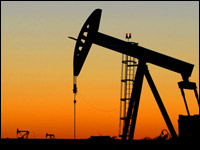Thursday, April 20, 2006
Crisis of Plenty

Is oil compatible with democracy? Can country rich in natural resources ever truly sustain the kind of democracy we in America have been so hopefully will grow in the Mideast? Yesterday, I attended a panel discussion with Thomas Friedman, author of The World Is Flat; Joseph Stiglitz, Nobel-prize-winning economist and author of Globalization and its Discontents; and 40-Emmy winning Ted Koppel. Friedman and Stiglitz brought up an interesting concept known in economics as the crisis of plenty - the idea that when a country is rich in natural resources such as oil or natural gas, its government doesn't have to pay as close attention to the desires of its people.
Oil-rich countries survive on oil exports. Other countries, such as America, India, and most of Europe survive on human labor - we are 'services-based' economies. Yes we have natural resources, but they are not the overwhelming foundation of our economy as in other countries. Because this second group of countries relies on its people to sustain its economy, these countries' governments must work hard to keep their citizens working within their borders. Oil countries, on the other hand, aren't worried about their largest industry - oil - leaving for some other country. Their sources of income are relatively fixed at the moment, and since human labor, especially intellectual labor, is only a relatively small contributor to their economies, their governments simply do not need to pay as close attention to their citizens in order to sustain themselves economically.
The question, then, is can a democratic government survive in an area where political leaders do not need the support of their people to survive economically? Can the international community bring a similar responsibility to bear on these countries merely through expectation that elections will remain free and fair and that these governments will truly remain accountable to their citizens? Can the international community's scorn ever truly replace the benign yoke of an economically necessary citizenry?
I would wager that it is, in fact, possible to create a sustainable democracy even in countries like Iraq, Kuwait, Saudi Arabia, and Venezuela, whose oil and natural gas reserves can sustain their economic independence for decades, if not centuries, to come. The constitutional framers of these countries, however, must be cognizant of the unique challenges they face and not merely assume that what works for other countries or even similar cultures, will also work for them.
Each country and Culture is unique and, in creating their own democracy, must think of themselves as such - tailoring their own systems of democracy to their own strengths and patching up their constitutions to shore-up their own weaknesses. America framed its constitution in retaliation to the injustices and weakness it saw in colonial, imperial government. Now, as more countries import democracy from the west, they must frame their own constitutions in reaction to their own former governments, closing the loopholes and plugging the leaks of their former rulers' governing philosophies. This is clearly not a simple task, nor is there truly an answer than can be 'imported.' Britain, France, The United States, and many other early modern democracies had to suffer through a long period of uncertainty and adjudication before everything became as stable as it seems today. New, Fledgling democracies, must understand that a new constitution is not a magic pill. It will take work and it needs to be tailored to the countries own specific symptoms, but eventually and with help, it can work.
